"All I've seen you eat today is rabbit food. Aren't you hungry?" my cousin asked me on our most recent family vacation. Before responding to her, I stopped and thought about what I had nibbled on: an apple, berries, carrot sticks, a salad, and some things like whole grains and proteins, too. But I saw where she was coming from. Unless you're a person who primarily eats fruits and veggies, it's hard to imagine just how filling these foods can be.
"No, not at all, I replied. "I'm eating the ultimate combo meal: fiber and water."
The experts agree that the two are seriously satisfying—even when these nutrients are coming from low-calorie things like carrots and apples. "Both fiber and water help to fill up the stomach and make us feel full," registered dietitian Isabel Smith tells us. "Fiber also helps to slow digestion and helps to regulate appetite and blood sugar levels."
If you're interested in filling up your plate—without filling out your pants—we're here to help! Below, you'll find a ranking of the 10 most filling fruits and 10 most filling veggies, based on their fiber and water content. Pick up a few of your top picks next time you hit the market, start munching, quell your hunger, and watch that excess weight melt away!
First, the Fruit…
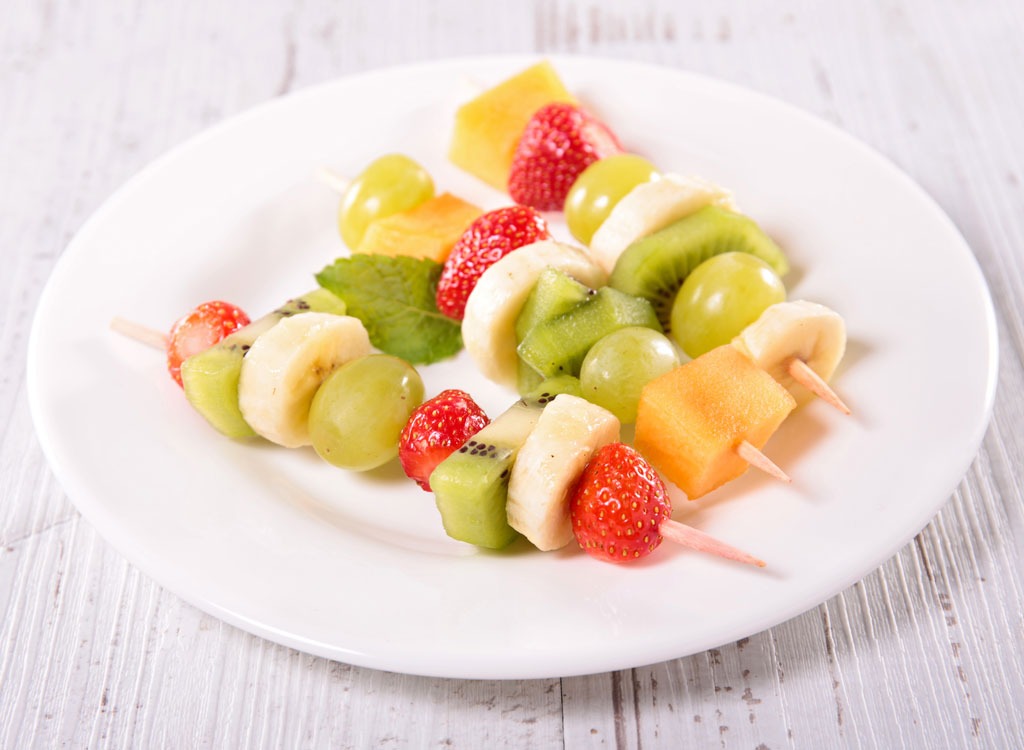
These are the most filling treats in Mother Nature's candy shop…
Cherries

Fiber per 100 grams (12 pieces): 2 g
Water Content: 82%
With just 87 calories per cup, cherries make a smart sweet and tart addition to any diet. Although it's a little-known fact, these ruby red treats are also a potent source of potassium. One cup has 306 milligrams of the powerful mineral—which is about what you'd find in a small banana. Nosh on cherries solo as a snack or add them to a bed of arugula or spinach along with some crumbled goat cheese, red onion, and dry-roasted pistachios for a filling side salad. You can even top if off with grilled chicken or fish to make it a meal.
Strawberries

Fiber per 100 grams (0.6 cup, sliced): 2 g
Water Content: 91%
Not only uber satiating, but strawberries are also a great source of powerful natural chemicals called polyphenols that have been shown to aid weight loss and stop fat cells from forming. Studies also show that eating the bright red fruit can help relieve stress by lowering levels of the stress hormone cortisol. Eat them plain, add them to yogurt or oatmeal, or blend them with a banana, almond milk, and ice for a sweet, sippable snack.
Apples with Skin
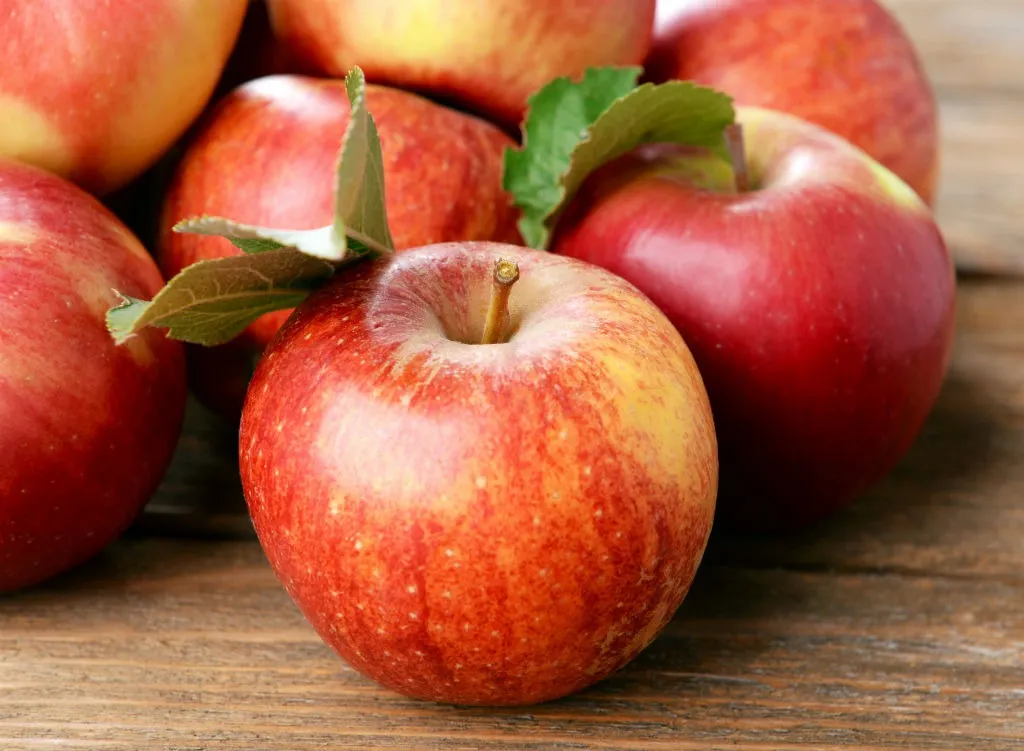
Fiber per 100 grams: 2.4 g
Water Content: 85.5%
As one of the easiest fruits to eat on the go, apples are one of my favorite fruits. And it's one that nutritionists love, too. "I've eaten an apple every day since high school," Tammy Lakatos Shames, RDN, CDN, CFT says. "Typically, I have one with breakfast; it's the perfect sweet crunch in the morning. Plus, it's a great way to get healthy, energy-revving carbs and a boost of fiber to keep my blood sugar level stable so I don't come crashing down. Not to mention, since apples are packed with heart-healthy flavonoids like quercetin, when I eat one a day I really feel like I'm helping to keep the doctor away!"
Blueberries
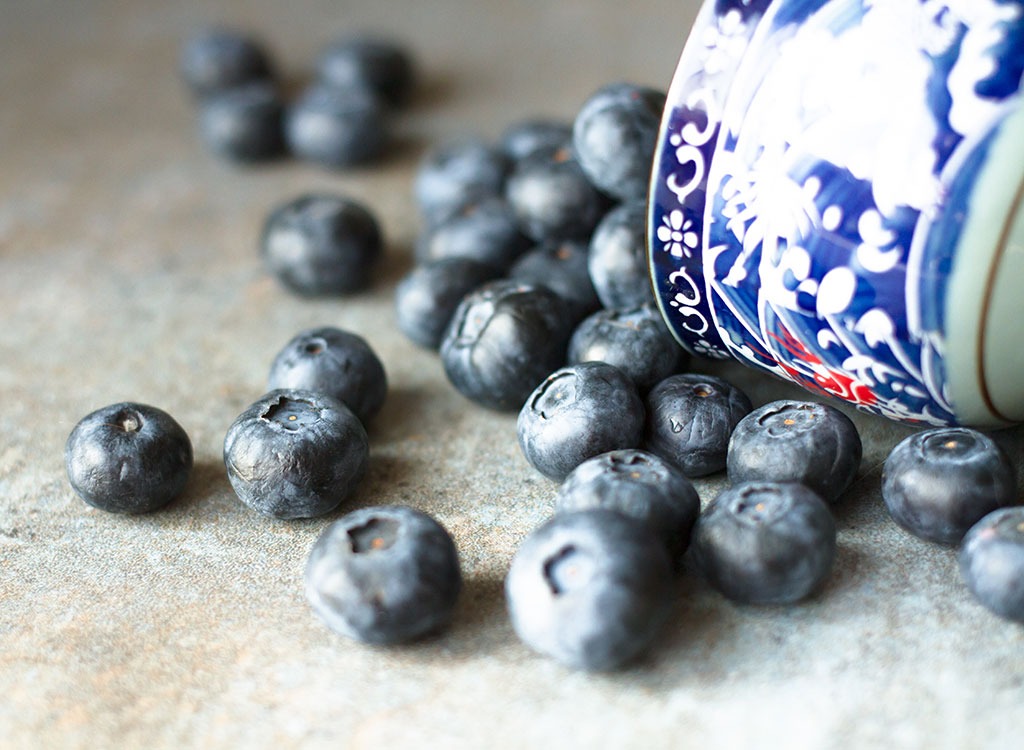
Fiber per 100 grams (0.7 cups): 2.4 g
Water Content: 84%
While they've never been marketed as a couch snack, I'd argue that water-packed blueberries are one of the best things to nibble on if you're a fan of nibbling in front of the TV—which is one of the most dangerous forms of mindless eating. Each little blue bite of heaven has less than a calorie—so you could literally eat a hundred—yes, I said 100—without derailing your diet. The berry is also loaded with polyphenols, which are chemical compounds that help prevent fat from forming, and catechins (the same stuff that makes green tea such a fat melter).
Banana
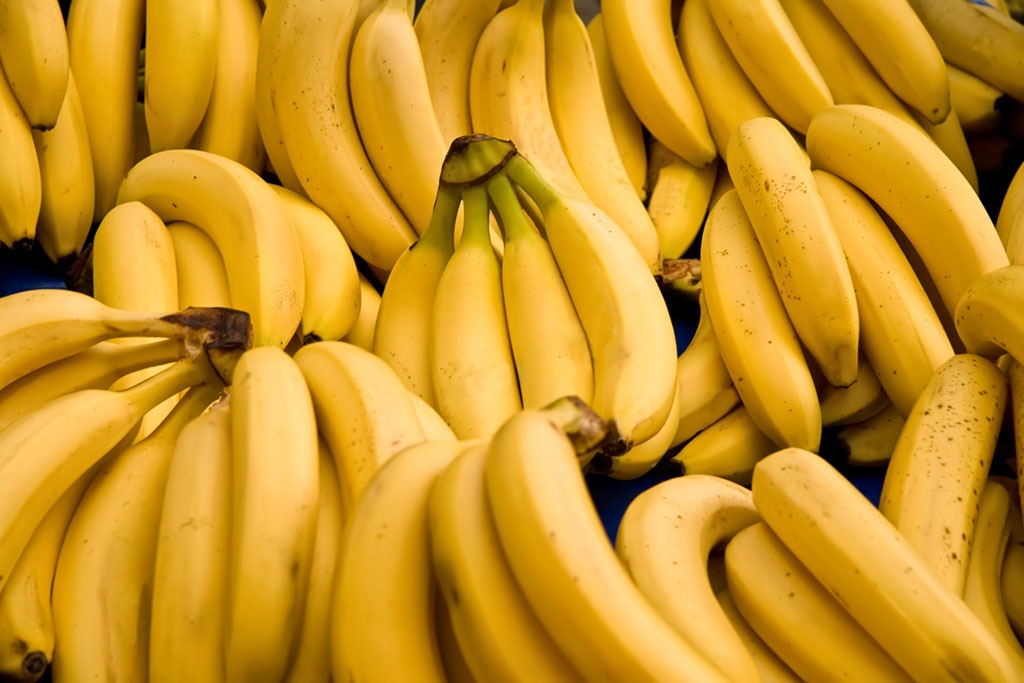
Fiber per 100 grams (small fruit): 2.6 g
Water Content: 75%
Though it's more often associated with monkeys and slapstick comedy than weight loss, we'd argue that bananas are one of the very best filling foods for those on a quest for flat abs. Not only can the fruit's water and fiber content keep you away from the vending machine, but its potassium can also fight off water retention and bloat. The mineral also aids post-workout muscles recovery. Translation: The faster you can get back to the gym after a tough session, the sooner you'll reach your better body goal.
Cranberries

Fiber per 100 grams (1 cup, whole): 3.6 g
Water Content: 87.3%
As long as you aren't eating the sugar-sweetened kind (whether that be granny's Thanksgiving recipe or the dried ones sold in bags), cranberries make for a smart addition to your diet. Not only will their high fiber and water contents quell tummy rumbles—making it easier for you to eat fewer calories—they may help to keep you cancer-free, too. In an analysis of the cancer-fighting phenol antioxidant content of 20 fruits, cranberries were found to have the highest amount. The red tart fruit also contains compounds that help keep bacteria like E. coli and staph from sticking to our cells. It's no wonder the pilgrims and other early settlers ate the berries to fight off disease.
Not sure how to prep cranberries without giving yourself a sugar rush? Try making salsa by combining fresh cranberries with celery, white onion, jalapeño, fresh cilantro, sea salt, sugar, and fresh lime juice. Simply pulse everything in a food processor and voila—snack time!
Blackberries
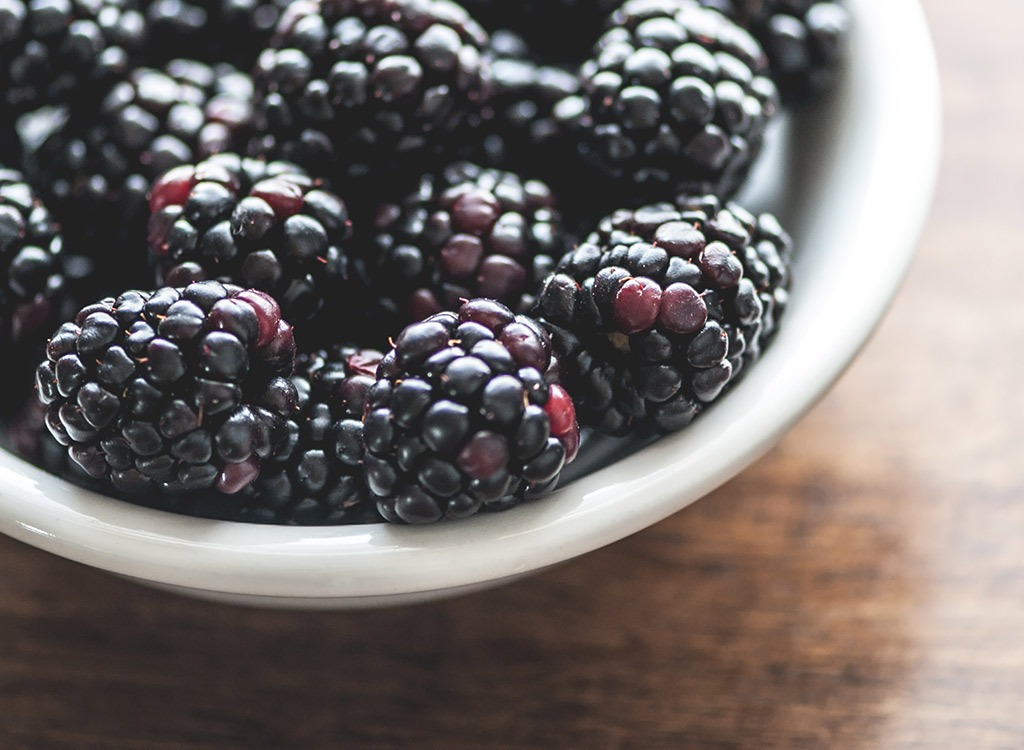
Fiber per 100 grams (0.7 cups): 5.3 g
Water Content: 88%
These antioxidant-rich berries not only help ward off disease but also pack more fiber than most other fruits. Not to mention, every cup of blackberries contains half the day's vitamin C, a nutrient that can help lower levels of cortisol, a hormone that triggers fat storage in the stomach—the very last place anyone wants to see it. Add them to oatmeal, cold cereals, or salads, blend them into smoothies, or eat them plain to reap the benefits.
Raspberries
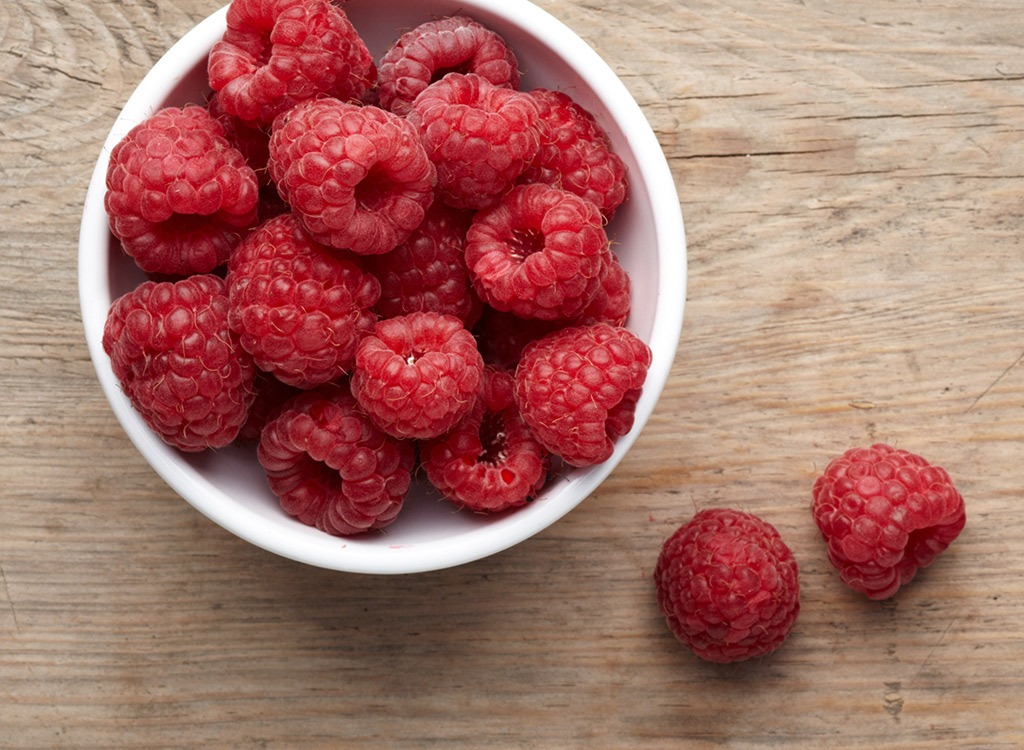
Fiber per 100 grams (0.8 cups): 6.5 g
Water Content: 86%
Not only are raspberries rich in water and fiber, they're also notably low in calories and sugar. A cup of the refreshing berry has just 84 calories and 5 grams of the sweet stuff, making this fruit a solid choice for those following a low-carb eating plan.
Dates

Fiber per 100 grams (4 dates, pitted): 6.7 g
Water Content: 21%
With 66 calories and 16 grams of sugar a pop, it's easy to understand why so many dieters steer clear of dates—but trust us, it's really not necessary to kick this food to the curb in the name of weight loss. In addition to all those calories, each fruit serves up nearly a half-gram of protein and 2 grams of fiber—which is what you'd find in 12 cherries! If you're worried about the sugar, though, cut yourself off after two, and smother them with all-natural nut butter, a salty-sweet protein-rich combination that registered dietitian Alissa Rumsey says she loves.
Avocado
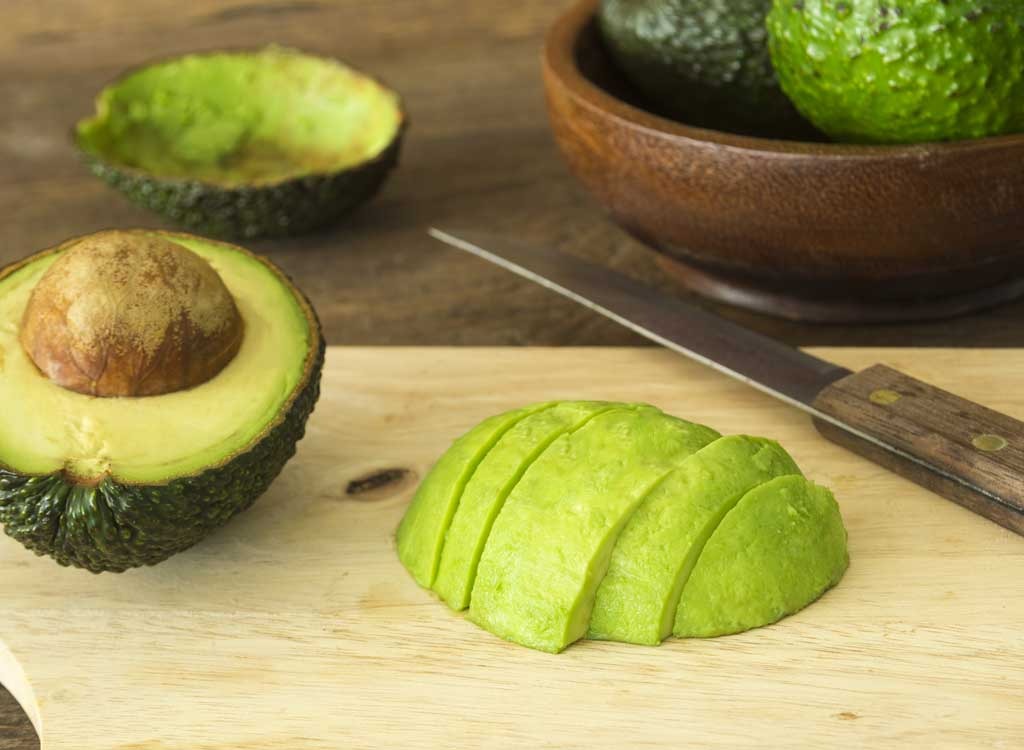
Fiber per 100 grams (0.75 cup): 6.7 g
Water Content: 73%
We know what you're thinking: 'Aren't avocados vegetables?' Nope! 'Cados are actually a single-seeded berry native to Mexico. They're also the numero uno (see what we did there?) most filling fruit on the planet. Jam-packed with fiber, a half-fruit serving provides 25 percent of the day's recommended intake. We can't ignore the avocado's many other benefits, either. The green machine provides nearly 20 vitamins, minerals, and phytonutrients, including B6, C and E, bloat-banishing potassium, magnesium, and folic acid! (Wowza!) And thanks to its high monounsaturated fat content, it can also prevent body fat from forming around the belly.
Now the Veggies…

Looks like mom was onto something when she told you to eat your veggies—especially if she was trying to get you to enjoy any of the veggies on the following list!
Celery
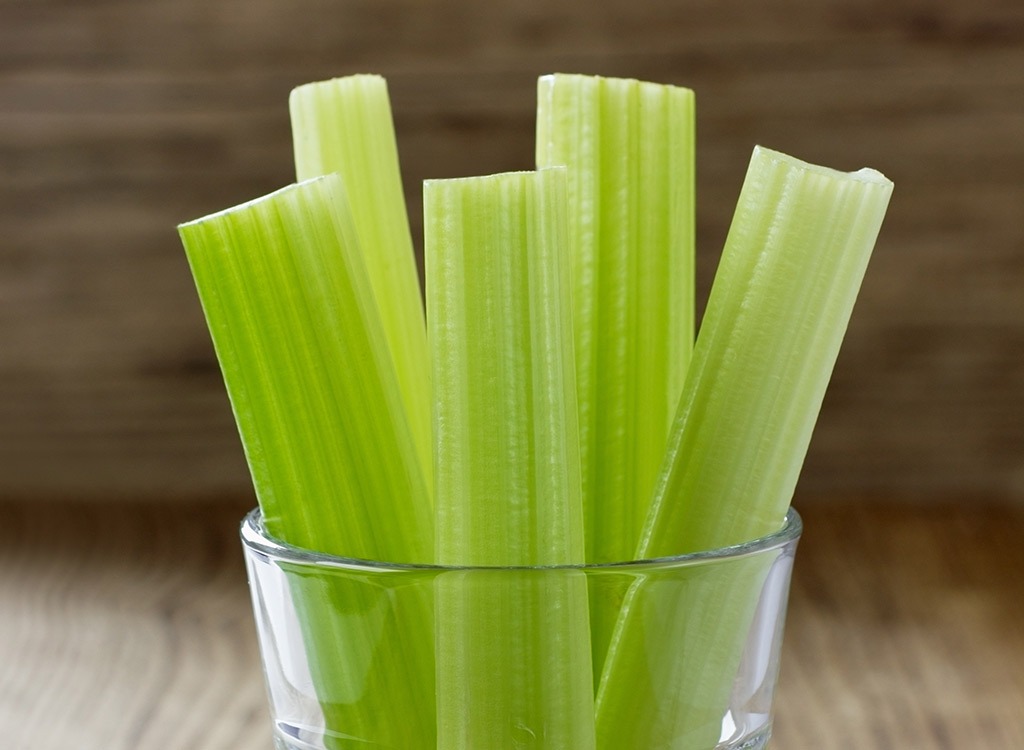
Fiber per 100 grams (1 cup, chopped): 1.6 g
Water Content: 95%
No, eating celery won't actually help you burn calories like the rumor mill would have you believe. (It only takes a little more than half a calorie to digest a stalk.) But it is a neutral-tasting veggie that works well in tons of dishes and can keep you full and satisfied. Add it to soups and stews, toss it into salads, quinoa, rice, and savory oatmeal dishes, or just smear some peanut butter on a stalk as a snack. Yum!
Asparagus
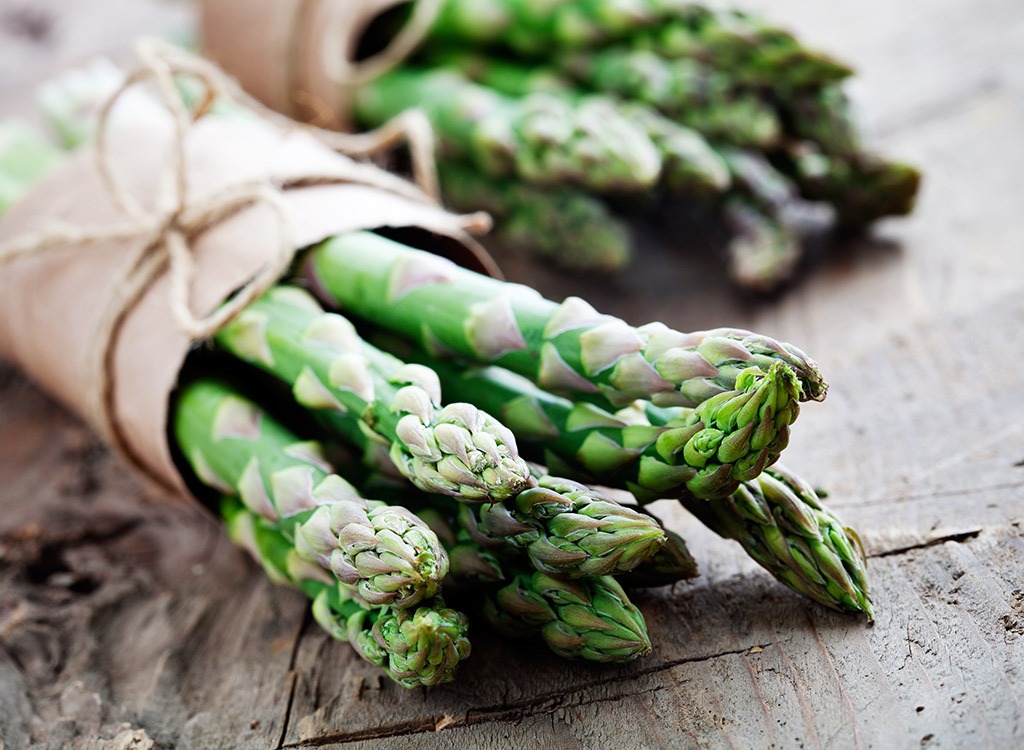
Fiber per 100 grams (7 spears): 2 g
Water Content: 92.6%
Not only is asparagus packed with water and fiber, it's also rich in potassium, a nutrient that helps the body flush out water and sodium—two things that make you bloat. Roast some in the oven with some EVOO and dried spices for a simple, yet filling side dish.
Cauliflower
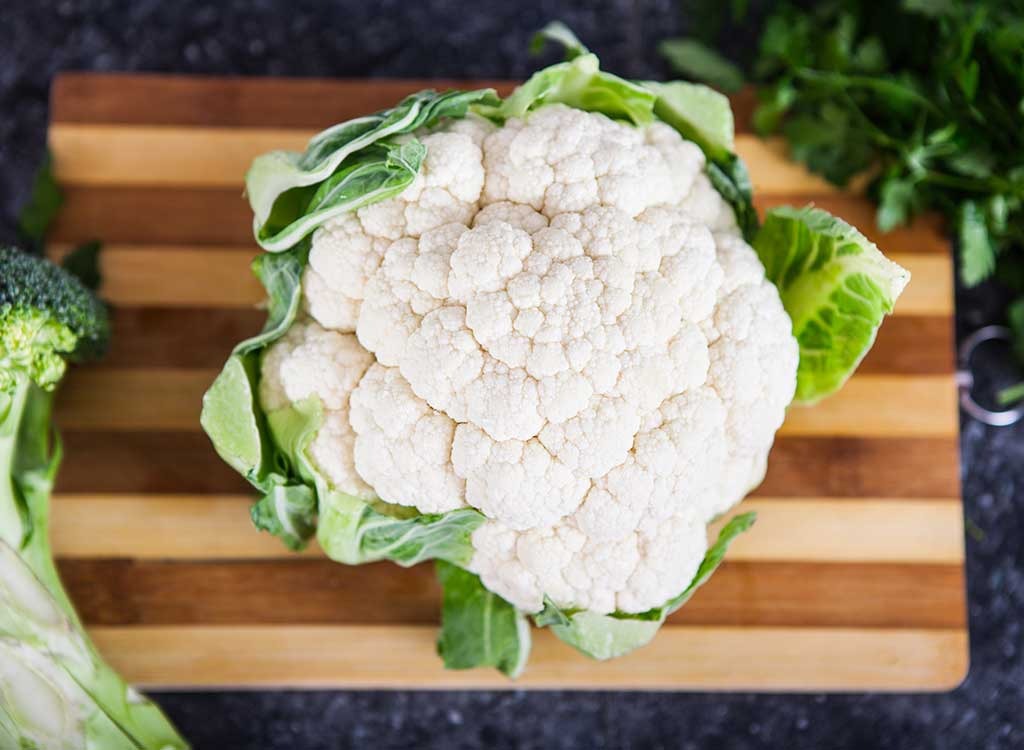
Fiber per 100 grams (1 cup, chopped): 2.3 g
Water Content: 93%
Stealing the #8 spot on our veggie countdown is cauliflower, a cruciferous vegetable that's over 90 percent water. Aside from its filling attributes, kale's white, tree-shaped cousin is rich in the cancer-fighting compounds, glucosinolates, that work to reduce cancer-causing inflammation.
Cabbage

Fiber per 100 grams (1.1 cups, chopped): 2.3 g
Water Content: 92.5%
Considering they're both part of the Brassica oleracea family, we're not surprised that cabbage has many of the same health-protective properties as cauliflower. It also provides 2.3 grams of fiber per cup, as well as a hefty dose of glucosinolates. Noshing on this bitter veggie can also help to lower your cholesterol levels by preventing the bile (the fluid secreted by the liver that aids digestion) from absorbing fat after a meal. We like to mix cabbage into Asian-inspired salads and stir-fries.
Brussels Sprouts
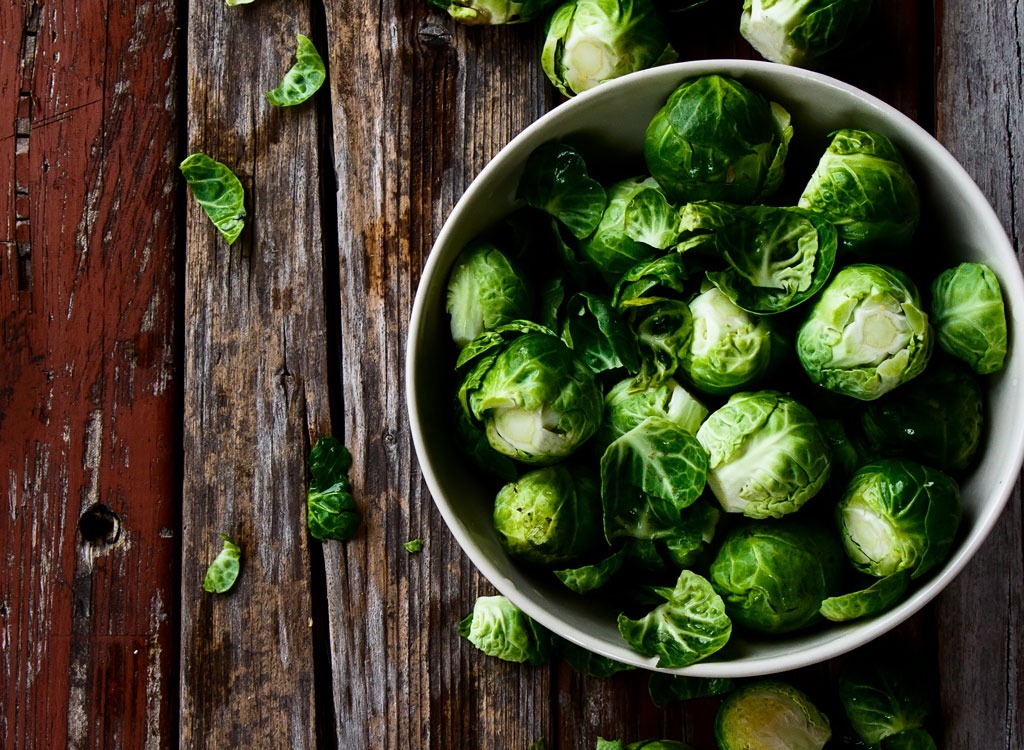
Fiber per 100 grams (1.2 cup): 2.6 g
Water Content: 88.9%
Yup, that's right, another member of the cabbage family is on our list! Filled with H20 and a fair share of fiber, sprouts are also one of Shaun T's go-to weight loss foods. "When cooked with a bit of olive oil and spices, Brussels sprouts taste amazing. Plus, they're filling, heart-healthy, and rich in vitamin C," Shaun T. tells us.
Raw Broccoli
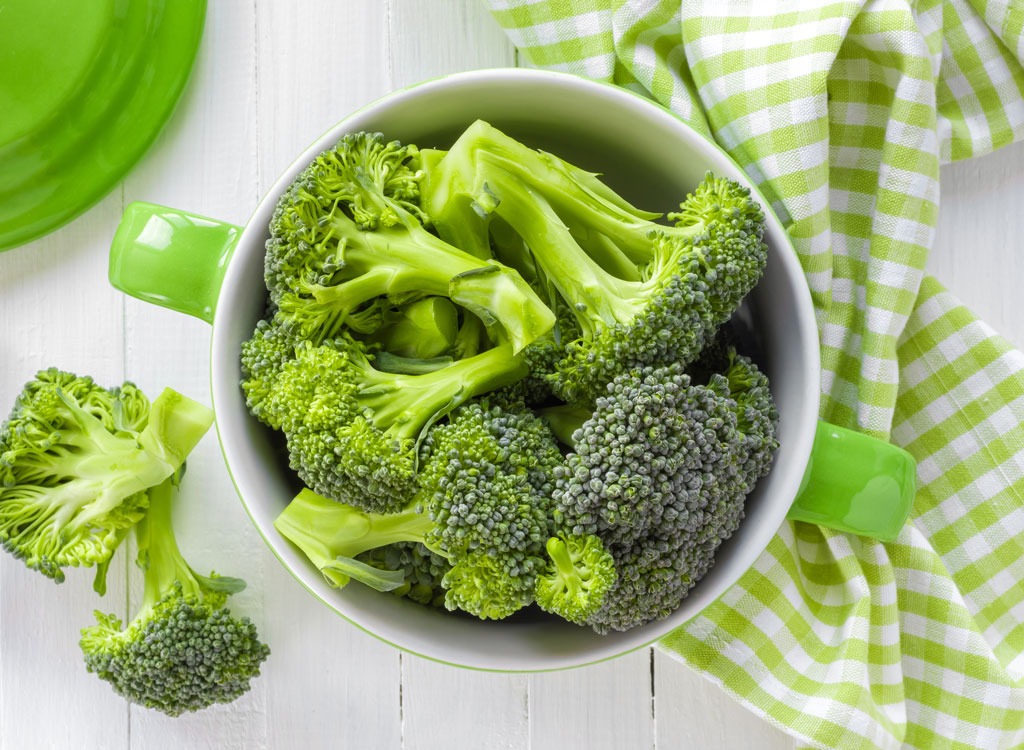
Fiber per 100 grams (1 cup, chopped): 2.6 g
Water Content: 89%
Broccoli, one of these best weight-loss superfoods, makes its mark smack dab in the middle of our veggie line-up. Aside from its satiating properties, one study found men who ate about 4 cups of broccoli per week had a decreased risk for prostate cancer compared to men who ate fewer than one serving per week. To get in on all of the health-boosting, belly-flattening benefits, add it to soups, salads, stir-fries, or simply dip it in hummus as a snack.
Baby Carrots
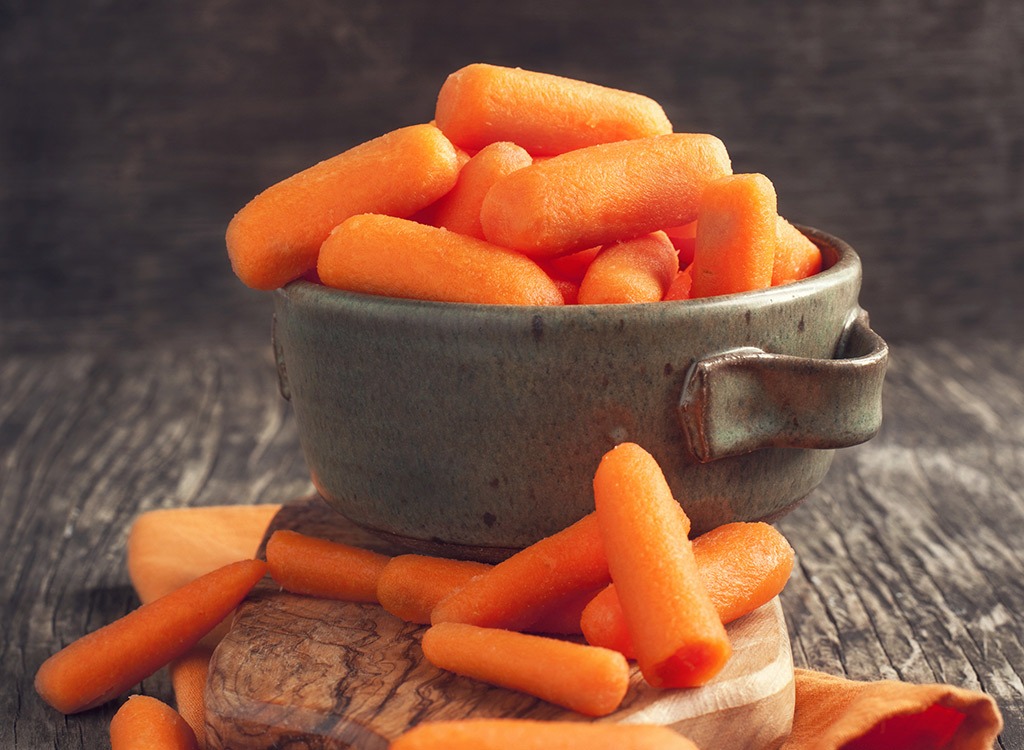
Fiber per 100 grams (10 medium): 2.9 g
Water Content: 90.3%
They may be small, but baby carrots are sort of amazing. No matter how you enjoy them—dipped in hummus, baked with EVOO and spices, or transformed into a creamy soup—this filling orange vegetable contains nutrients that boost immunity, reduce cholesterol, protect the heart, and yes, keeps your peepers healthy, too. The fact that noshing on them will keep you full and slim is just another one of its many benefits.
Snap Peas
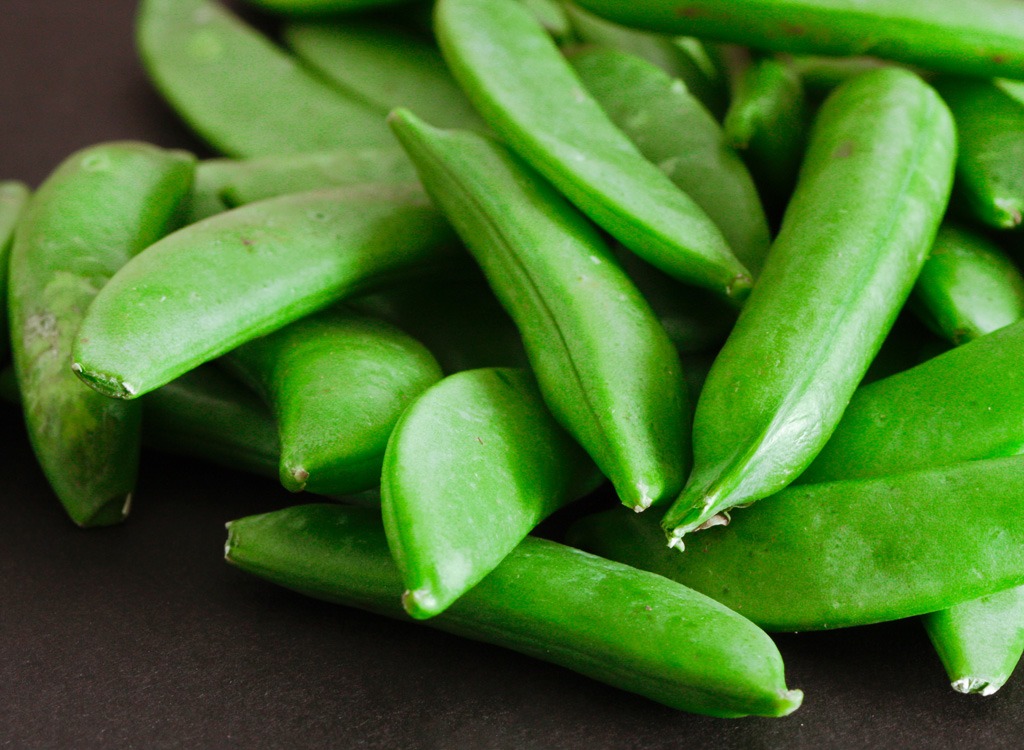
Fiber per 100 grams (0.9 cups): 3.4 g
Water Content: 90%
Throw a cup of these in a Ziplock back and chow down when that afternoon hunger strikes. Pairing them with hummus will up the fiber count even further—just plan to stick to one of these best hummus choices to ensure you stay on track with your healthy eating and weight loss plan.
Beet Greens
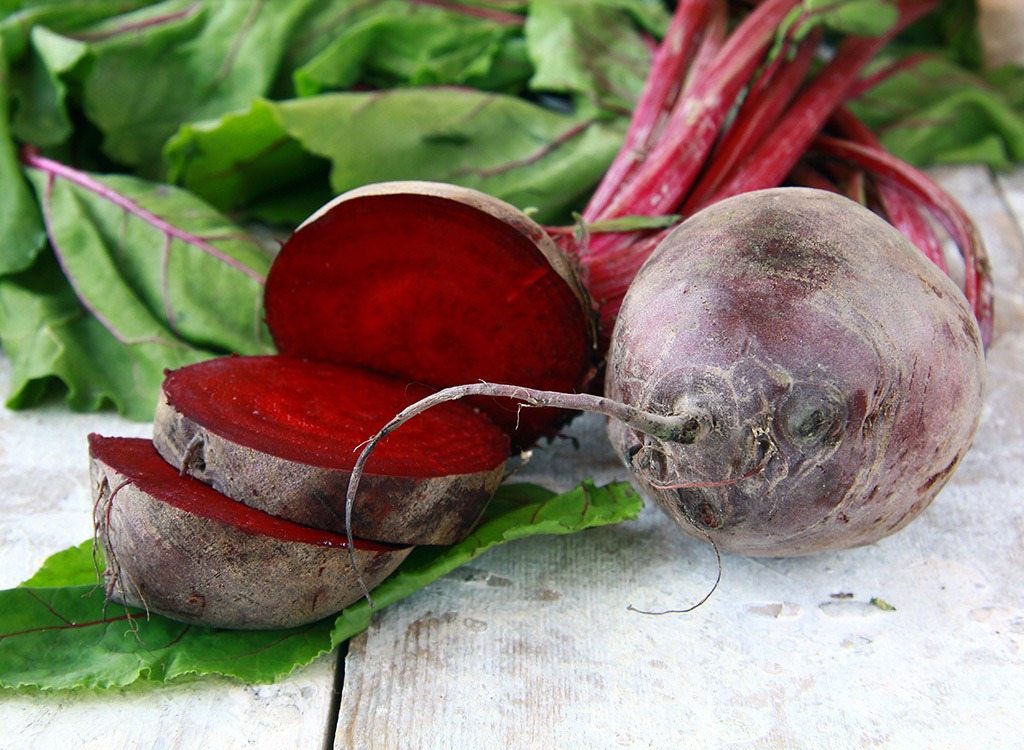
Fiber per 100 grams (0.7 cups): 5.4 g
Water Content: 89%
If you typically toss beet leaves in the trash you might want to consider changing your ways. Packed with vitamins K, A, and C, and ample amounts of fiber and water, the leafy green is both filling and health-protective.
Artichokes
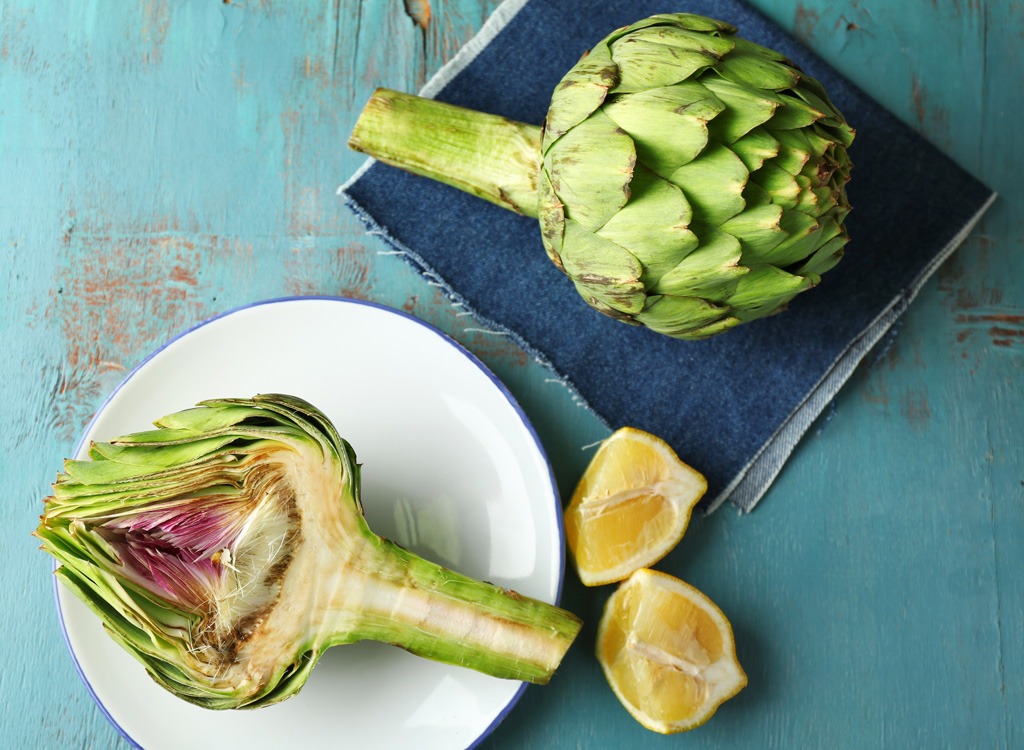
Fiber per 100 grams (0.8 medium vegetable): 5.7 g
Water Content: 84%
And the veggie winner is… the almighty artichoke! A large French artichoke contains just 76 calories and packs a fair share of the day's fiber, a nutrient that's been linked to lower body fat. The veggie also has a powerful diuretic effect, meaning it can banish that pesky belly bloat and excess fluid that's making your six-pack look more like a two-pack.
No comments:
Post a Comment